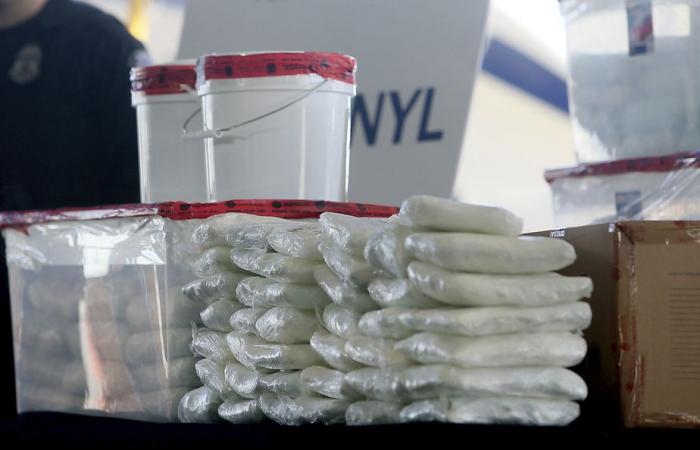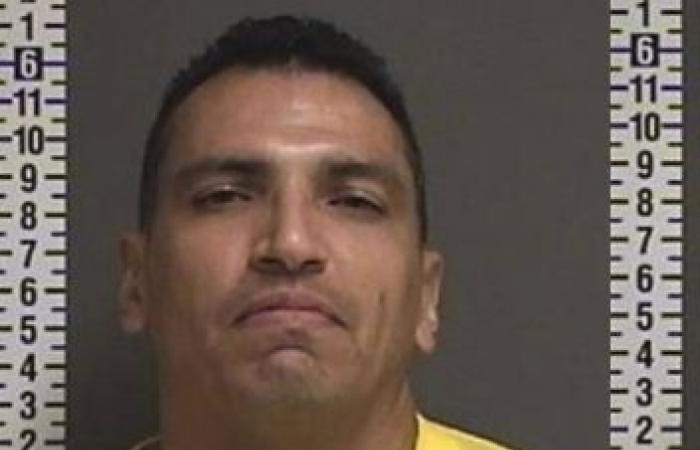Last year, just 0.1% of fentanyl seized at U.S. borders came from Canada. A drop in the ocean of drugs entering the United States through Mexico. Why then does Donald Trump blame this problem on the Canadian authorities? Particularly because the Americans fear that some of the criminal networks active in this market are pulling strings from here, says an expert.
Published at 5:00 a.m.
The figures are unequivocal: year after year, fentanyl seizures by American border agents are overwhelmingly concentrated at the southern border. Over the past two years, of the 49,000 books seized, barely 53 books have been seized at the Canadian border. The rest were seized, the vast majority, at the Mexican border.
One of the few networks that exported fentanyl to the United States from Canada was identified during Donald Trump’s first term in office. It was led by Daniel Vivas Ceron, a Colombian of origin imprisoned in a Drummondville penitentiary for attempted murder. With his cell phone, he continued to manage his affairs in detention. He purchased his product in China, then took orders from American distributors, to whom he mailed the narcotics.
PHOTO PROVIDED BY RCMP
Daniel Vivas Ceron
At the request of the American authorities, agents of the Royal Canadian Mounted Police (RCMP) burst into his cell, seized his telephone, his accounts, information on his Chinese suppliers and his American clients, as well as his contact list. The operation exposed the entire network.
During a press conference in May 2018, the Attorney General of the Trump administration, Jeff Sessions, praised Quebec police officers for their help in this matter. He even mentioned the name of Sergeant Jacques Théberge, an RCMP investigator based in Saint-Hubert. “Great job. Excellent Canadian support,” he said.
Exports in decline
Overall, the export of drugs from Canada to the United States appears to have been in decline for several years. The reference on the subject is the National Drug Threat Assessment of the American Drug Enforcement Administration (DEA), a periodic report which lists the major threats linked to illegal drug trafficking.
The word “Canada” or “Canadian” appears 13 times in the 2019 edition of the report, mainly in connection with the export of cannabis and ecstasy produced by Asian organized crime groups on Canadian soil.
In the 2024 edition of the report, no trace of the words “Canada” or “Canadian”. Zero.
In contrast, the report cites the words “Mexico” or “Mexican” 132 times.
The report also deals largely with fentanyl, a synthetic opioid approximately 40 times more powerful than heroin which caused some 75,000 deaths by overdose last year in the United States.
Other grievances
With such a picture, why is Donald Trump targeting Canada by linking his threat of tariffs to the fentanyl crisis and crime in general?
“This tariff will remain in place until drugs, particularly fentanyl, […] stop this invasion of our country,” he wrote on social media, adding that “thousands of people are arriving from Mexico and Canada, bringing crime and drugs to levels never seen before.”
In reality, the next American president is repeating an old grievance of American authorities who believe that Canada is not tackling transnational criminal groups that threaten American society, including those behind the fentanyl crisis, says Calvin Chrustie, police officer at retired who spent 33 years in the RCMP before ending his career at the rank of superintendent.
Chrustie, who has worked extensively with U.S. authorities in the fight against transnational organized crime, said border seizure statistics don’t tell the whole story.
You don’t just have to look at the seizures. This is a reductive way of looking at the problem. The stakes are bigger than that!
Calvin Chrustie, former RCMP executive
“We are talking about criminal enterprises which are structured as international corporations and which generate billions of dollars. The United States has determined that some of the proceeds, yes, but also some of the criminal infrastructure, the financing, the money laundering, is located in Mexico, China and Canada. This is why we are lumped together,” he explains.
According to Mr. Chrustie, the difficulty of Canadian police services in carrying out complex investigations into the illicit movement of funds of transnational organized crime greatly irritates our American neighbors, especially since Canada has been identified as a popular financial center for several of these groups. The cumbersome nature of the Canadian judicial process in these cases and in cases of terrorism, foreign interference and espionage is seen as a threat to the national security of the United States, he explains.
“Heavy and slow”
“Within the Five Eyes alliance [États-Unis, Canada, Royaume-Uni, Australie, Nouvelle-Zélande]Canada has one of the most cumbersome and slow justice systems. This affects our ability to face foreign threats,” says the former RCMP executive.
Acquittals due to the Jordan decision and aborted trials due to problems with disclosure of evidence, which often make headlines in Canada, are closely monitored by American authorities, says Mr. Chrustie.
Just recently, the Quebec Court of Appeal had to rule on the validity of a search warrant executed by the Canadian police at the home of a professor at McGill University, accused in the United States of stealing technologies for military use China. The warrant was executed in 2017 in response to an FBI mutual assistance request, but multiple legal challenges in Canadian courts prevented U.S. authorities from gaining access to the material for seven years.
Americans are more aware of the problems of Canadian intelligence and policing than the average Canadian.
Calvin Chrustie, former RCMP executive
Police officials, in Quebec and elsewhere in Canada, have complained for years about operating within a legal framework that makes the fight against sophisticated criminal organizations very difficult.
“Until someone takes care of the problem, there will be consequences,” believes Mr. Chrustie.







